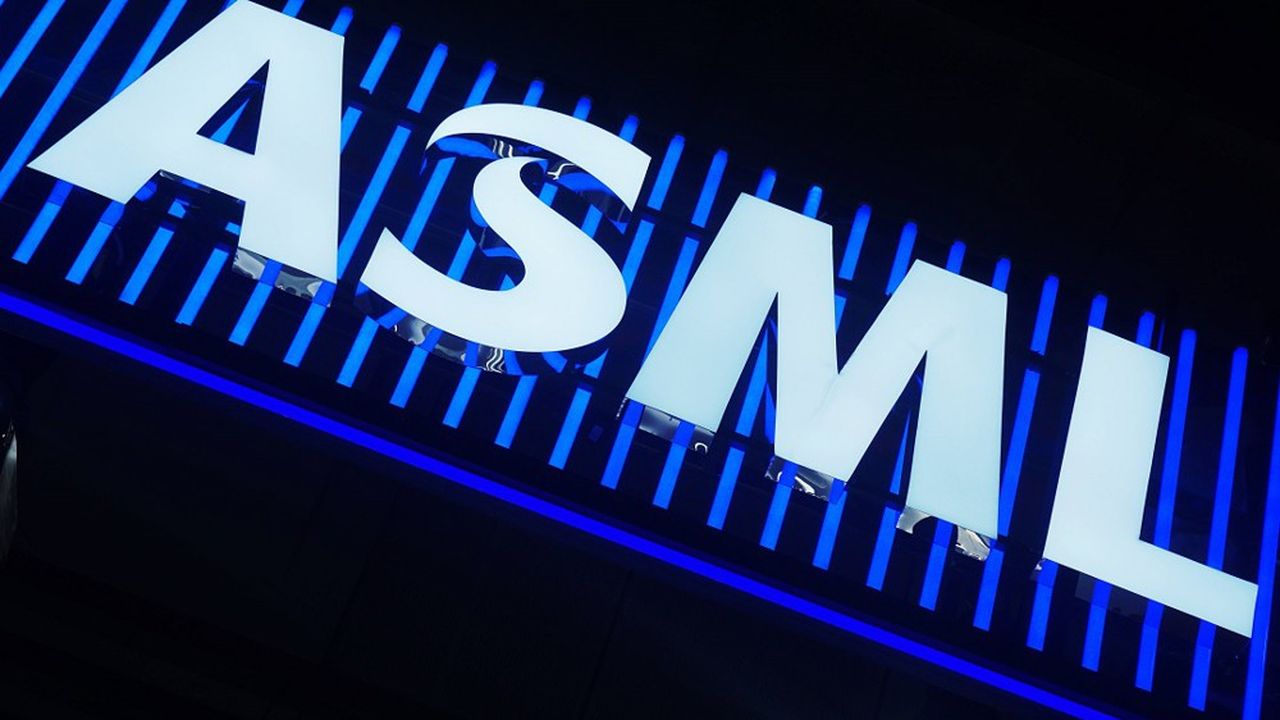ASML Plunges 7% on Q1 Revenue Miss

ASML Holdings (NASDAQ:ASML) experienced a 7% intra-day drop in its shares following the announcement of first-quarter sales for fiscal 2024 that did not meet expectations. The company reported net sales of 5.29 billion euros, which fell short of the expected 5.39 billion euros. However, its net profit reached 1.22 billion euros, surpassing the forecasted 1.07 billion euros.
Year-over-year comparisons show a 21.6% decrease in net sales and a significant 37.4% reduction in net income. A notable concern was the net bookings for ASML’s equipment, a critical indicator of future revenues, which totaled 3.61 billion euros. This figure represents a 4% decrease from the previous year and a significant decline from the prior quarter, falling well below the expected 4.63 billion euros.
Despite these challenges, ASML maintained its annual sales forecast at 27.6 billion euros, the same as the previous year, and anticipates stronger performance in the second half of 2024, aligning with the broader industry recovery from the downturn. CEO Peter Wennink described 2024 as a transitional year, emphasizing ongoing investments in capacity ramp-up and technology to prepare for an anticipated market upturn.
ASML also highlighted the necessity to secure around 4 billion euros in orders each subsequent quarter to achieve its 35 billion euros revenue goal for the year, indicating the company’s strategic focus on meeting these targets amidst current challenges.
| Symbol | Price | %chg |
|---|---|---|
| AMD.BA | 25100 | -0.48 |
| LRCX.BA | 3952.5 | -0.7 |
| 000660.KS | 395500 | 0 |
| TXN.BA | 55000 | -0.55 |

ASML Holding N.V. (NASDAQ:ASML) Stock Update and Future Outlook
- Deutsche Bank reaffirms its "Buy" rating for ASML Holding N.V. (NASDAQ:ASML), increasing the price target from EUR 700 to EUR 900.
- ASML's stock performance outpaces broader market indices, with a significant 28.13% surge over the past month.
- Upcoming earnings report expected to show earnings of $6.36 per share and revenue of $8.81 billion, indicating continued strong performance.
ASML Holding N.V. (NASDAQ:ASML) is a key player in the semiconductor industry, specializing in the development and manufacturing of photolithography machines used in the production of integrated circuits. As a leader in this niche, ASML competes with other major technology companies like Applied Materials and Lam Research. On September 30, 2025, Deutsche Bank reaffirmed its "Buy" rating for ASML, with the stock priced at $970.51. The bank also increased ASML's price target from EUR 700 to EUR 900, indicating strong confidence in the company's future performance.
ASML's recent stock performance has been impressive. The stock closed at $962.61, marking a 1.17% increase from the previous session. This gain outpaced the broader market indices, with the S&P 500, Dow, and Nasdaq showing smaller increases of 0.26%, 0.15%, and 0.48%, respectively. Over the past month, ASML's stock has surged by 28.13%, significantly outperforming the Computer and Technology sector's 7.4% gain and the S&P 500's 2.87% increase.
Investors are eagerly awaiting ASML's upcoming earnings report, set for release on October 15, 2025. Analysts expect the company to report earnings of $6.36 per share, reflecting a year-over-year growth of 9.66%. The consensus estimate also forecasts ASML's revenue to reach $8.81 billion, indicating a 7.34% increase compared to the same quarter last year. These projections suggest continued strong performance for ASML.
Currently, ASML is trading at approximately $973.93, with a price increase of about 1.18%, translating to a gain of $11.32. The stock has fluctuated between a low of $966.23 and a high of $975.64 during the day. Over the past year, ASML has reached a high of $977.48 and a low of $578.51. The company's market capitalization stands at approximately $382.95 billion, with a trading volume of 342,523 shares, reflecting strong investor interest.

ASML Holding N.V. (NASDAQ:ASML): A Pillar in the Semiconductor Industry
- Justin Patterson from KeyBanc sets a price target of $800 for ASML, indicating a potential increase of 6.04%.
- China's reliance on ASML's EUV technology underscores its critical role in the global chip ecosystem.
- Despite recent volatility and a stock price decrease of 8.33%, ASML's strategic importance and market position remain strong.
ASML Holding N.V. (NASDAQ:ASML) is a key player in the semiconductor industry, known for its advanced lithography machines. These machines are crucial for producing the latest generation of microchips. ASML's technology is essential for companies like Nvidia, which rely on it to maintain their competitive edge in the global market.
On July 17, 2025, Justin Patterson from KeyBanc set a price target of $800 for ASML. At that time, the stock was priced at $754.45, suggesting a potential increase of 6.04% to reach the target. This target reflects confidence in ASML's market position and technological advancements, particularly in its EUV technology.
Patrick Moorhead from Moor Insights & Strategy emphasizes China's reliance on ASML's EUV technology as a significant advantage for the company. This dependence highlights ASML's critical role in the global chip ecosystem, reinforcing its market strength. Despite a recent stock price decrease of 8.33%, ASML's strategic importance remains evident.
ASML's stock has shown volatility, with a daily range between $730.60 and $760.90. Over the past year, the stock has seen a high of $1,077.05 and a low of $578.51. This fluctuation reflects the dynamic nature of the semiconductor industry and the challenges it faces, including geopolitical tensions and supply chain disruptions.
ASML's market capitalization is approximately $296.65 billion, with a trading volume of 10.71 million shares. These figures underscore the company's significant presence in the market. As the semiconductor industry continues to evolve, ASML's role in shaping its future remains crucial, particularly in light of its technological innovations and strategic partnerships.

ASML Holding N.V. (NASDAQ:ASML) Receives "Overweight" Rating Amid Semiconductor Industry Developments
- KeyBanc upgraded ASML Holding N.V. (NASDAQ:ASML) to "Overweight," signaling a positive outlook for the company.
- ASML's EUV lithography technology is crucial for the global chip ecosystem, providing a competitive advantage.
- Despite the upgrade, ASML's stock experienced an 8.33% decrease, highlighting market volatility.
ASML Holding N.V. (NASDAQ:ASML) is a key player in the semiconductor industry, known for its advanced lithography machines used in chip manufacturing. On July 17, 2025, KeyBanc updated its rating for ASML to "Overweight," indicating a positive outlook on the stock. At that time, ASML's stock was priced at $754.45.
ASML's technology, particularly its EUV (Extreme Ultraviolet) lithography machines, is crucial for the global chip ecosystem. As highlighted by Patrick Moorhead from Moor Insights & Strategy, China's reliance on ASML's EUV technology is a significant advantage for the company. This dependence acts as a protective barrier, or "moat," for ASML in the competitive semiconductor market.
Despite the positive rating from KeyBanc, ASML's stock has seen a decrease of 8.33%, dropping by $68.57. The stock has fluctuated between a low of $730.60 and a high of $760.90 during the day. Over the past year, ASML's stock has reached a high of $1,077.05 and a low of $578.51, reflecting its volatility in the market.
ASML's market capitalization is approximately $296.65 billion, indicating its significant presence in the industry. The company's trading volume stands at 10.71 million shares, showing active investor interest. As the semiconductor industry continues to evolve, ASML's strategic position and technological advancements remain crucial for its growth and stability.

ASML Shares Plunge 10% as 2026 Growth Outlook Wavers Despite Strong Q2 Beat
ASML (NASDAQ:ASML) shares fell more than 10% intra-day today after the semiconductor equipment maker signaled uncertainty about its 2026 growth outlook, even as its second-quarter results exceeded expectations.
The company had previously projected back-to-back growth years for 2025 and 2026, but now says it can no longer confirm revenue growth for 2026 due to rising macroeconomic risks. While ASML did not formally withdraw guidance, the shift represents a notable change in tone and rattled investor confidence.
For the second quarter of 2025, ASML reported net sales of €7.69 billion, surpassing the €7.54 billion consensus. Gross margin came in at 53.7%, also ahead of estimates, while earnings per share were 14% higher than Jefferies' forecast.
New bookings reached €5.5 billion, beating expectations of €4.47 billion. Orders for low and high numerical aperture EUV systems accounted for €2.3 billion of the total. However, bookings for memory-related systems dropped 41% year-over-year, reinforcing concerns about softening DRAM demand.
Looking ahead to Q3 2025, ASML provided revenue guidance of €7.4 billion to €7.9 billion, below the consensus forecast of €8.18 billion. Gross margin is expected to land between 50% and 52%, roughly in line with market expectations.
For full-year 2025, ASML reaffirmed its 15% revenue growth target, implying €32.5 billion in sales, consistent with its previous guidance range and broadly aligned with consensus. The company narrowed its gross margin forecast for the year to around 52%, from an earlier range of 51% to 53%.
Despite delivering a strong second quarter, ASML’s cautious stance on 2026 has heightened concerns about the semiconductor industry's demand outlook and triggered a sharp sell-off in its shares.

ASML Holding NV (NASDAQ:ASML) Surpasses Earnings and Revenue Estimates
- ASML Holding NV reported earnings per share of $6.85, beating the estimated $5.94, with revenue reaching $8.94 billion, surpassing forecasts.
- The company's outlook for 2026 is cautious due to geopolitical and economic uncertainties, despite strong demand from artificial intelligence sectors.
- ASML's financial strength is evident with a net profit increase to €2.3 billion and a robust gross margin of 53.7%, alongside a healthy price-to-earnings ratio of 31.92 and a debt-to-equity ratio of 0.21.
ASML Holding NV, listed on the NASDAQ as ASML, is a leading supplier of semiconductor manufacturing equipment. The company is renowned for its advanced lithography machines, which are crucial for producing microchips. ASML's major clients include industry giants like TSMC and Intel. The company competes with other semiconductor equipment manufacturers, but its cutting-edge technology gives it a competitive edge.
On July 16, 2025, ASML reported impressive financial results, with earnings per share of $6.85, surpassing the estimated $5.94. The company's revenue reached approximately $8.94 billion, exceeding the forecasted $8.79 billion. This strong performance is attributed to the robust demand for semiconductor manufacturing equipment, driven by the artificial intelligence boom.
Despite the positive results, ASML has issued a warning about its outlook for 2026, citing geopolitical and economic uncertainties. Chief Executive Christophe Fouquet emphasized the challenges posed by macro-economic and geopolitical developments, which may impact the company's growth prospects. However, the demand from artificial intelligence customers remains strong, providing some optimism for the future.
In the second quarter of 2025, ASML's net profit surged to €2.3 billion, up from €1.6 billion in the same period last year. The company achieved total net sales of €7.7 billion, with a gross margin of 53.7%. ASML also reported a significant increase in new orders, reaching €5.6 billion, driven by the surge in demand for its chip-making machines.
Looking ahead, ASML anticipates third-quarter sales to be between €7.4 billion and €7.9 billion, with a gross margin between 50% and 52%. For the full year of 2025, the company expects total net sales growth of approximately 15% compared to 2024, maintaining a gross margin around 52%. Despite the challenges, ASML's financial metrics, such as a price-to-earnings ratio of 31.92 and a debt-to-equity ratio of 0.21, indicate a strong financial position.

ASML Holding N.V. (NASDAQ:ASML) Earnings Preview: A Look into the Semiconductor Giant's Financials
- ASML Holding N.V. (NASDAQ:ASML) is set to release its quarterly earnings with an anticipated EPS of $5.87 and revenue of approximately $8.84 billion.
- The company's EUV lithography technology positions it as a leader in the semiconductor industry, facing competition from Nikon and Canon.
- Despite geopolitical risks, ASML's financial metrics, including a P/E ratio of 31.14 and a debt-to-equity ratio of 0.21, highlight its strong market position and financial health.
ASML Holding N.V. (NASDAQ:ASML) is a key player in the semiconductor industry, specializing in the production of photolithography machines used in chip manufacturing. The company is renowned for its EUV lithography technology, which is crucial for producing advanced semiconductor chips. ASML's competitors include companies like Nikon and Canon, but its cutting-edge technology gives it a competitive edge.
On July 16, 2025, ASML is set to release its quarterly earnings, with Wall Street estimating an earnings per share (EPS) of $5.87 and revenue of approximately $8.84 billion. Analysts anticipate ASML will surpass these estimates, driven by strong demand for AI chips and its EUV lithography tools. The Zacks Consensus Estimate places revenue slightly lower at $8.55 billion, but still indicates a positive outlook.
ASML's anticipated earnings growth is supported by a 37.5% year-over-year increase in EPS, rising from $4.32 to an estimated $5.94. Revenue is expected to grow by 27.2%, reflecting the robust demand for AI chips. Despite challenges from export restrictions to China, demand for DUV systems provides some relief, highlighting ASML's resilience in the face of geopolitical risks.
The company's financial metrics reveal a strong market position. ASML's P/E ratio of 31.14 and price-to-sales ratio of 8.84 indicate a high market valuation, justified by its competitive advantage and growth prospects. The enterprise value to sales ratio of 8.67 and enterprise value to operating cash flow ratio of 23.43 further underscore its strong financial standing.
ASML maintains a healthy balance sheet with a debt-to-equity ratio of 0.21, indicating low debt levels. The current ratio of 1.52 suggests good liquidity, ensuring the company can cover its short-term liabilities. Despite potential risks from China's export controls, ASML's dominant position in the semiconductor market and strong demand for its technology support a positive outlook.

ASML Holding N.V. (NASDAQ:ASML) Earnings Report and Financial Health Overview
- ASML Holding N.V. (NASDAQ:ASML) reported an EPS of $6.80, surpassing the estimated $6.12.
- The company's revenue of $8.77 billion slightly missed the forecasted $8.78 billion.
- ASML's financial health remains solid with a P/E ratio of 31.21 and a low debt-to-equity ratio of 0.20.
ASML Holding N.V. (NASDAQ:ASML) is a prominent player in the semiconductor industry, specializing in the production of advanced chip-making equipment. As the world's largest supplier in this sector, ASML plays a crucial role in the global technology supply chain. The company faces competition from other major players like Applied Materials and Lam Research.
On April 16, 2025, ASML reported earnings per share (EPS) of $6.80, exceeding the estimated $6.12. However, its revenue of $8.77 billion slightly missed the forecasted $8.78 billion. Despite the positive EPS, ASML's stock has declined, as highlighted by Barrons, due to concerns over sales guidance affected by tariffs from the Trump administration.
ASML's sales guidance has been negatively impacted by the ongoing U.S. trade war, which has introduced uncertainty into its business operations. The company has warned about the volatility of tariffs, which could further affect its future projections for 2025 and 2026, as noted by Reuters. This uncertainty has led to a cautious outlook for the company.
The company's financial metrics provide insight into its current standing. ASML has a price-to-earnings (P/E) ratio of 31.21, indicating the price investors are willing to pay for each dollar of earnings. Its price-to-sales ratio is 8.36, reflecting the value placed on each dollar of sales. The enterprise value to sales ratio is 8.04, showing the company's total valuation relative to its sales.
ASML's financial health is further supported by a low debt-to-equity ratio of 0.20, indicating a conservative use of debt. The current ratio of 1.53 suggests a solid ability to cover short-term liabilities with short-term assets. Despite challenges, ASML's financial metrics demonstrate a stable foundation, providing some reassurance to investors amidst the current uncertainties.







